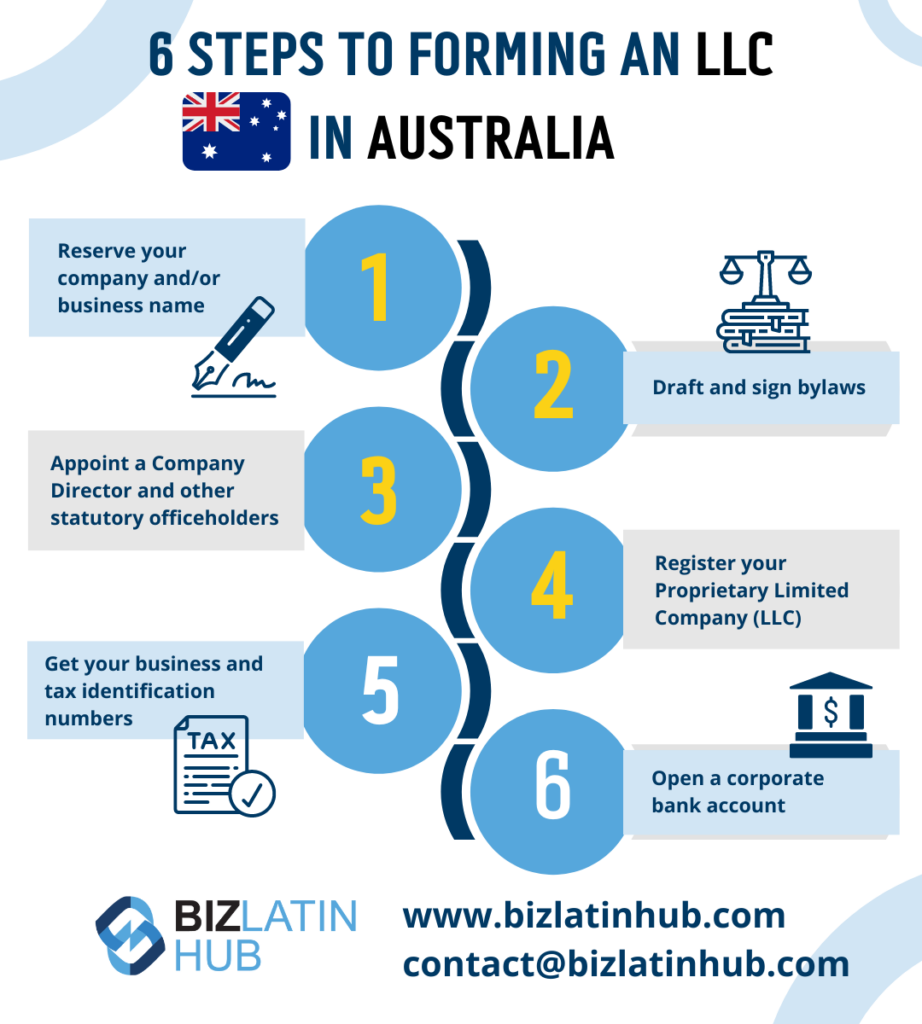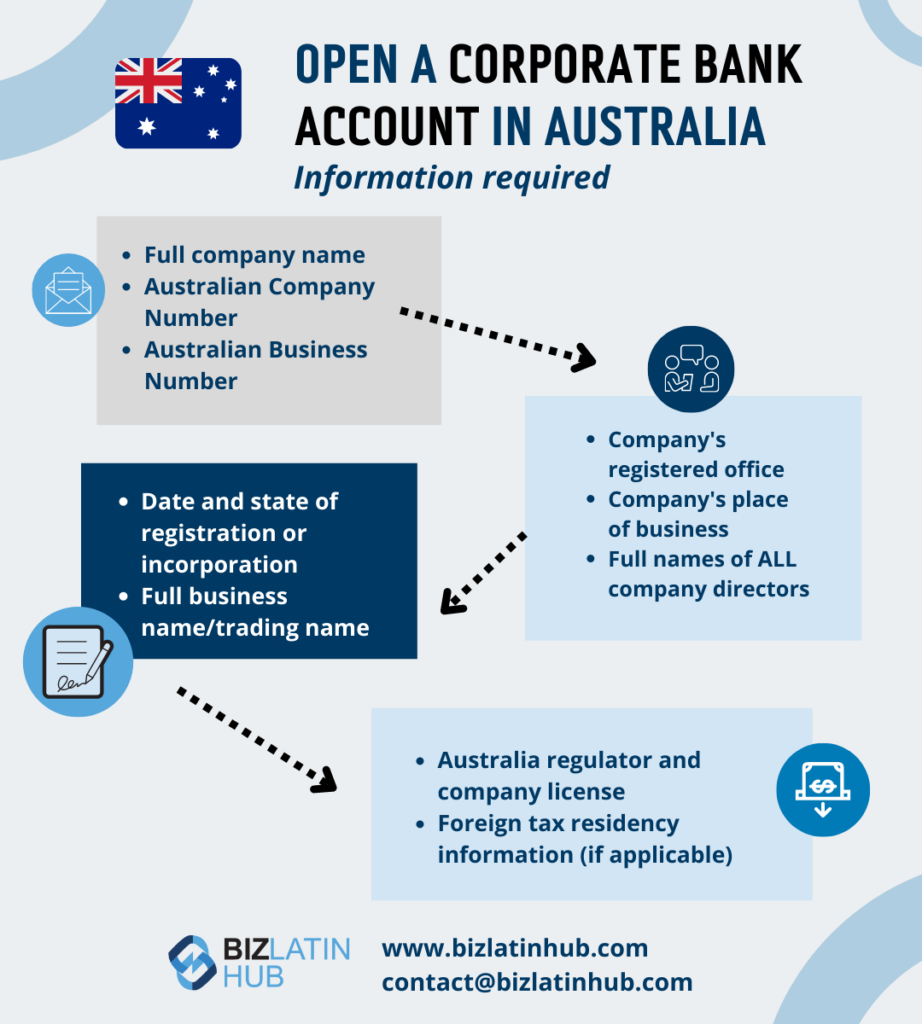Find out what key steps you must follow when forming a Limited Liability Company (LLC) in Australia. In Australia, the equivalent to the LLC is called a Proprietary Limited Company (PTY) or Private Proprietary Company. In order to be in full corporate compliance when you set up an LLC in Australia, you must have a good understanding of the characteristics of this entity type and what your legal obligations are.
Over the past 26 years, Australia has had consistent positive economic growth. Its economy is strong in mining, agriculture, and services, and the people are highly innovative. The country’s proximity to wealthy Asian markets makes it a powerful regional hub.
Read on to understand the key steps to forming your LLC in Australia.

Table of Contents
What do you need to provide to get started with your LLC in Australia?
To proceed with incorporating your new LLC in Australia , you will need to provide the following:
- Confirm the name of the new legal entity to be incorporated
- Provide shareholder identification documents
- Confirm the business activities and corporate purpose of the company
- Share Entity Capital: Confirm the value and type of share structure
What are the Characteristics of an LLC in Australia?
An LLC or a Proprietary Limited Company in Australia has few requirements to set up, which is why it is the most common type of legal entity in Australia. Like other LLC entity types, the owner is not personally liable for company debt.
The minimum requirements to form an LLC in Australia include:
- 1 shareholder
- 1 company director
- 1 resident director
- Zero minimum share capital
For foreigners looking to conduct commercial activities in Australia, setting up a Proprietary Limited Company is one of the best available options.
LLCs in Australia need to produce annual financial statements. However, they do not need to register for GST if that year’s sales do not exceed AU$75,000.
How do I Form an LLC in Australia?
In Australia, the government authorities that administer company formation processes are the Australian Securities and Investments Commission (ASIC) and the Department of Industry, Innovation, and Science.
Typically, the first step towards company formation in Australia is choosing your legal entity type. If you have chosen to start a Proprietary Limited Company (the LLC), the next steps are as follows:
1. Reserve your company and/or business name
Each company in Australia needs its own unique company name. It cannot be the same as that of another business. It is a good idea to check that your chosen name does not conflict with any registered or pending trademarks in Australia.
If you do not choose a company name during the company formation process, your Australian Company Number (ACN) will act as your company name.
The company name must display its legal status; as a Proprietary Limited Company, you must include ‘Proprietary’ or ‘Pty’.
A business name is slightly different from a company name. Business names do not create new, separate entities. Your business name is your trading name.
2. Draft and sign bylaws for your LLC in Australia
The next step when you form an LLC in Australia is to decide on the governance of the company There are multiple ways to do this. Your options include:
- operating your company under the replaceable rules listed under the Corporations Act,
- creating a unique constitution,
- incorporating elements of the replaceable rules, and include your own.
A Proprietary Limited Company with a sole director, who is also a single shareholder, does not need a formal internal governance system.
3. Appoint a Company Director and other statutory officeholders
To form your LLC in Australia, you will need to partner with a legal representative residing in Australia. This role is known as the Company Director. Each proprietary company must have at least one director.
The Company Director is responsible for overseeing the affairs of the company. Foreign companies can choose to appoint a Nominee Director, who is external to the company but is authorized to make legal decisions on its behalf. The individuals in these roles are responsible for ensuring the company is fully compliant with all obligations under the Corporations Act.
You will want to find a private services provider with experience in all commercial aspects of Australian law, including company incorporation, hiring staff, the signing of complex legal contracts, and company liquidation.

4. Register your Proprietary Limited Company (LLC) in Australia
You can register your company online or on paper. Australia’s Business Registration Services provides an online portal to complete your application.
There are certain cases where a company cannot register online. Therefore, it is helpful to engage an external service provider on the best steps for your company.
Once approved, your Proprietary Limited Company will receive its Australian Company Number, Australian Business Number, certificate of registration, and a corporate key to update your company information securely.
5. Get your business and tax identification numbers
Next, you must register for the appropriate taxes for your LLC in Australia. All businesses need a tax file number (TFN) to do this. This is automatically generated when you receive your Australian Business Number (ABN).
The ABN is a unique 11-digit number that identifies your business or organization to the government and community. This process can also be done online through the Business Registration Service website.
Before you can start doing business in Australia, you may need to register for goods and services (GST), income, withholding, and fringe benefits taxes, depending on your circumstances.
6. Open a corporate bank account
Once your company has been registered, you can set up a corporate bank account. There are several highly reputable banks in Australia offering a number of corporate banking options.
Generally, you can choose to create corporate checking, savings, and term deposits or fiduciary accounts. Each of these account types serves different purposes, and each can be valuable for companies.
The country’s Anti-Money Laundering and Counter-Terrorism Financing Act in 2006 set strict regulations for banks to undertake their due diligence with new applicants. For this reason, you can expect to provide a wide range of documentation confirming your and your directors’ information, identification, and details of your newly-registered company.
Common Questions when forming a company in Australia
Answers to some of the most common questions we get asked by our clients.
Yes, a business can be 100% foreign owned by either legal persons (“legal entities”) or natural persons (“individuals”).
Registering a company in Australia takes 4 weeks.
A proprietary company in Australia, denoted by “Pty Ltd” in its name, is a common business structure for small to medium-sized enterprises. It offers limited liability to shareholders (1-50), restrictions on share transfers, and compliance with ASIC regulations. While it has reporting requirements, it enjoys greater privacy than public companies.
In Australia, a public company is a business entity that can raise capital from the general public through the issuance of shares and can be listed on the Australian Securities Exchange (ASX). It has no limits on the number of shareholders and is subject to more extensive regulatory and reporting requirements compared to proprietary companies.
In Australia, Both types of companies, Proprietary Company, and Public Company offer Limited Liability
A. Number of Partners: A Proprietary Company can be formed by a minimum number of 1 shareholder and a maximum of 50 shareholders. While the Public company can be formed by a minimum number of 1 shareholder and no maximum number of shareholders.
B. Administration: A Proprietary Company must have at least 1 director who resides in Australia but can also have non-resident director(s). Directors do not have to be Australian citizens or permanent residents. Note: All directors must apply for a director identification number before they can be appointed. While the Public Company must have at least 3 directors 2 of whom reside in Australia and can have non-resident directors. Directors do not have to be Australian citizens or permanent residents. Note: All directors must apply for a director identification number before they can be appointed.
C. Annual Meetings: A Proprietary Company doesn’t have an annual general meeting (AGM) required. While in the Public Company, an annual general meeting is required.
D. Auditor: Generally, small proprietary companies and some large proprietary companies need not appoint an auditor. While a Public Company is required to appoint an external auditor and more financial and reporting requirements. Increased disclosure obligations.
Contact the Experts to Form your LLC in Australia
As a foreign company expanding to Australia, it’s beneficial to seek out an external provider who can act as your Nominee Director in the country. That way, you can get specialist support to form your LLC in Australia in full compliance with corporate regulations.
Get started in a strong, stable economy with minimum liability by forming a Proprietary Limited Company in Australia through Biz Latin Hub. Our team of local and expatriate professionals has the depth of knowledge and experience to enable foreign companies in Australia through providing a full range of market entry and back-office services. This includes market entry strategy, company formation, ongoing commercial representation, hiring, visa processing, and due diligence activities.
Get in touch with us here at Biz Latin Hub for personalized advice on how you can get started.
Learn more about our team and expert authors.

The information provided here within should not be construed as formal guidance or advice. Please consult a professional for your specific situation. Information provided is for informative purposes only and may not capture all pertinent laws, standards, and best practices. The regulatory landscape is continually evolving; information mentioned may be outdated and/or could undergo changes. The interpretations presented are not official. Some sections are based on the interpretations or views of relevant authorities, but we cannot ensure that these perspectives will be supported in all professional settings.